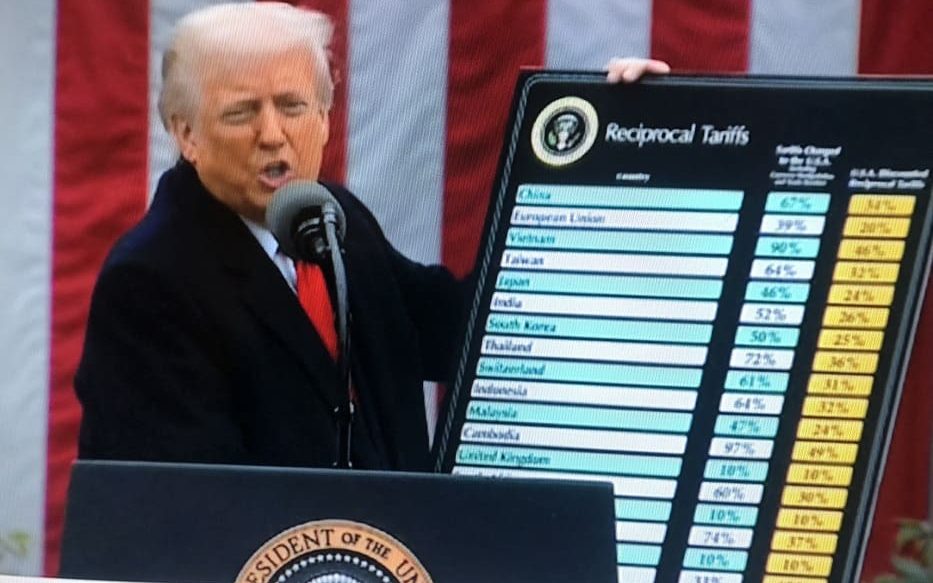
Donald Trump with his list of countries, including Australia, to be hit with reciprocal tariffs.
UNCERTAINTY about the impact of American president Donald Trump’s tariffs on China and global wool demand is wracking Australia’s wool industry.
About 86 percent of Australia’s wool goes to China for processing for domestic sale or for re-sale as yarn, fabric or garments for sale overseas.
Half of the Australian wool exported to China is absorbed domestically and half is exported after processing to mainly Europe and to a lesser extent America.
Raw wool demand has been stymied by the depressed global economic terms of trade and the 145pc tariff on China’s products into America, if maintained, would logically have an impact. But analysts believe the bigger concern for the Australian wool industry is the impact of a global recession brought on by Mr Trump’s tariffs.
International textile consultant Jimmy Jackson said before the advent of Mr Trump’s tariffs, the United States was looking to be the best retail market within a depressed global economic situation, and especially in the sports and outdoor garment sector.
“That was looking fairly good, whereas the rest of the world was … the fashion people aren’t buying new fabric and some haven’t ordered for next year.
“Nobody is buying fashion items,” he said.
“Also it was cheaper in the US because the dollar continued to get stronger and stronger.
“So if you get paid in US dollars then you are going to buy online now from anywhere, it was looking good for you.”
The Scandinavian market was also looking good, but it has a low population.
The 145pc tariff on China could be “a disaster” for the wool industry if it is maintained, Mr Jackson said, but with the daily changes in Mr Trump’s tariff rhetoric and actions, “nobody knows what is actually going to happen.”
However, Mr Jackson said the impact on Australia of the China tariff could happen quickly. He is aware that some companies have already redirected to other countries containers of woolen products en route to the United States.
Mr Jackson said the other issue was that major wool processing companies from China and Europe have established lower cost mid-stage operations in countries like Vietnam who have also been hit with tariffs, which could impact wool demand.
“They have put a 46pc tariff on Vietnam.”
Mr Jackson said domestic China retail demand was already depressed before the tariffs, complicated by unemployment and lack of consumer confidence.
He said the larger wool processors and garment manufacturers predict their raw material, yarn and fabric purchases in advance after visiting retailers to be ready for autumn/winter (Northern Hemisphere) retail marketing in the coming season.
“So unless they can sell the yarn, the fabric or the garments, they are not going to buy wool.
“We normally about 18 months in advance.”
But there are also speculators that buy wool when it is cheap, so this could mute or delay the impact of the tariffs levied on China and other wool processing countries.
 Mr Jackson said the per capita purchasing of wool products by US customers is quite small, but overall the market is significant and is the market leader and trend setter for sports/outdoor and casual wear.
Mr Jackson said the per capita purchasing of wool products by US customers is quite small, but overall the market is significant and is the market leader and trend setter for sports/outdoor and casual wear.
The sector is a major user of Australian Merino wool and most products are processed in China, he said.
Mr Jackson said the global wool retail situation has also changed retail and brand attitudes to traceability and sustainability in the face of rising costs and less consumer confidence.
“So it’s all about survival … they are still interested in traceability, but it’s not top of the list for most.”
Major impact has been fluctuating currency exchange rate
Australian Council of Wool Exporters and Processors president Josh Lamb said the major volume market for Australian wool is still worsted fabric, with America being significant destinations for 18-18.5 micron suiting fabric out of China and Italy.
Mr Lamb said if the US tariff on China continued indefinitely it could be assumed that it would have an impact on the demand and pricing of raw Australian wool.
“China has been hand-to-mount on Merino types for quite a few years now and we’ve seen this week that China is still buying, which is good.
“When we went through this (Trump tariffs on China) in 2018 and 2019, we went weeks where China didn’t want to buy a bale,” he said.
“So at our end it feels like they (China) were expecting Trump to get into office and they were expecting if he got into office that tariffs would come.
“They’ve managed their expectations of what was coming so it is less of a shock,” he said.
“It think it is impossible to factor these things into pricing when you look at what happened this week.”
Mr Lamb said there has been no direct impact on wool sales of the tariffs, but in terms of sentiment.
“The biggest impact on the market this week (last week) has been currency swings, where the Aussie dollar (in US dollar terms) has gone up and down about 9 percent during the week.
“You are talking changes in US prices for wool to China of US30-50 cents day to day, when we are usually looking at movements of US5-15 cents so it’s completely outside the range.
“That’s the short-term impact, but there will be a long-term impact if all this sticks of course, because it has to dampen global economic conditions which will affect consumer spending.”
Wool not at a disadvantage – AWI
Australian Wool Innovation chairman Jock Laurie said the wool market works well based on economic confidence.
“Anything that dampens that confidence obviously will have an impact, so the number one thing is that this has created a lack of confidence, you can see that in the share markets around the world.
“So there is a chance that anybody trading at the moment will feel uncertain, so that’s number one.
“The second thing is that it would appear to us that there are tariffs on many countries that export wool especially into America,” he said.
He said other countries would be affected by the tariffs, including Vietnam, Bangladesh and Europe that made it difficult to assess what the impact on Australian wool would be.
But Mr Laurie said he didn’t think Australian wool was at a disadvantage compared to other fibres. American also imported a lot of synthetic garments from around the world which would be affected by tariffs.
“But I don’t the world has really settled down at this stage so you couldn’t give any definitive answer I don’t think and I don’t honestly think anybody could.”
It’s a case of wait and see – WoolProducers
WoolProducers Australia chief executive officer Jo Hall said it was a “wait and see” situation as far as tariff impacts were concerned and the
“All we can really do is watch the market because we don’t know.
“The situation is changing day by day.”
Ms Hall said it is unclear what impact the US tariff announcement will have on the Australian wool market.
“But we do know from previous experience that given that China takes over 80 percent of our wool, when the US placed tariffs on China in 2018/19 that there was a negative effect on our wool price.
“Given China buys and processes over 80 percent of Australian wool, of which about 50 percent of that is then exported globally. Global economic uncertainty does not generally bode well for wool demand,” she said.
“Further, the overall consumer demand in China may weaken, including the domestic consumption of our wool which is about 50 percent of what China buys from Australia, reducing domestic appetite for wool products and further cutting import needs.
“However, prices might continue to stabilise given tight global supply of wool particularly with the significant reduction in production volumes from Australia, but the immediate outlook hinges on how severely tariffs disrupt China’s textile exports,” Ms Hall said.
“Obviously, we will all be watching the wool market and only then will we know what the actual fall out is.”

HAVE YOUR SAY